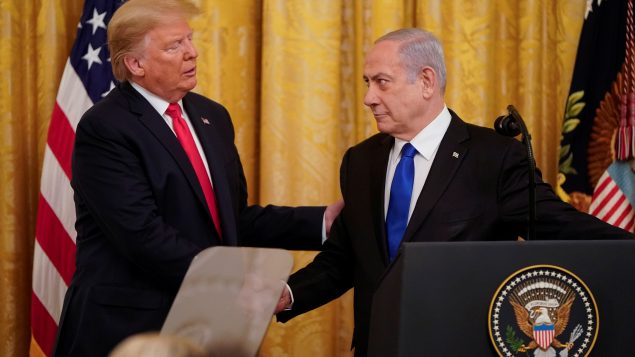Canada will “carefully examine the details of the U.S. initiative for the Middle East peace process,” Foreign Affairs Minister François-Philippe Champagne said Tuesday, calling for a negotiated solution to the Israeli-Palestinian conflict.
The carefully worded statement avoided any assessment of President Donald Trump’s initiative, seen as another significant departure from decades of U.S. policy in the Middle East. It also refrained from calling Trump’s latest diplomatic initiative a “peace plan.”
The plan, which was released at a White House event with Israeli Prime Minister Benjamin Netanyahu on Tuesday, supports the Israeli position on nearly all of the most contentious issues in the decades-old conflict, including the borders of a future Palestinian state, the status of Jerusalem and the fate of refugees.

Palestinian demonstrators burn poster depicting U.S. President Donald Trump and Israeli Prime Minister Benjamin Netanyahu during a protest against the U.S. Middle East peace plan, in Rafah in the southern Gaza Strip Jan. 28, 2020. (Ibraheem Abu Mustafa/REUTERS)
Trump proposed creating a demilitarized Palestinian state with borders drawn to meet Israeli security needs, while granting U.S. recognition of Israeli settlements on occupied West Bank land and of Jerusalem, including the entire Old City, as Israel’s indivisible capital.
The plan diverges from previous U.S. policy and a 2002 Arab League-endorsed initiative that offered Israel normal relations in return for an independent Palestinian state and full Israeli withdrawal from territory captured in the 1967 Middle East war.
“Canada remains committed to the goal of achieving a comprehensive, just and lasting peace in the Middle East,” Champagne said in a statement. “This includes the creation of a Palestinian state living side by side in peace and security with Israel and ensuring Israel’s security within its own borders.”
There is an urgent need to renew efforts toward a negotiated solution to the Israeli-Palestinian conflict, Champagne said.
“Canada has long maintained that peace can only be achieved through direct negotiations between the parties,” Champagne said. “We urge the parties to create the conditions for such negotiations to take place.”

Israeli border police arrests a Palestinian ahead of a protest against Middle East peace plan announced Tuesday by U.S. President Donald Trump, which strongly favours Israel, in Jerusalem, Wednesday, Jan 29, 2020. (Mahmoud Illean/AP Photo)
He also pledged Canada’s support for “meaningful dialogue between the parties toward a negotiated and viable two-state solution.”
Trump’s plan received some support from regional allies that find themselves increasingly aligned with the United States and Israel in confronting Iran.
The Saudi Foreign Ministry expressed appreciation for Trump’s efforts and support for direct peace negotiations under U.S. auspices. At the same time, state media reported that King Salman had called the Palestinian president to reassure him of Riyadh’s unwavering commitment to the Palestinian cause.
Egypt and Jordan, which already have peace deals with Israel, as well as Bahrain, Qatar and the United Arab Emirates (UAE) used similar language that swung between hope for re-starting talks and caution against abandoning long-held stances.
Despite Palestinians’ rejection of the plan and boycott of Trump over perceived pro-Israel bias, three Gulf Arab states – Oman, Bahrain and the UAE – attended the White House gathering in a sign of changing times.
With files from The Associated Press and Reuters







For reasons beyond our control, and for an undetermined period of time, our comment section is now closed. However, our social networks remain open to your contributions.